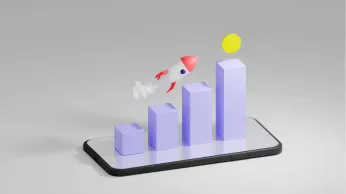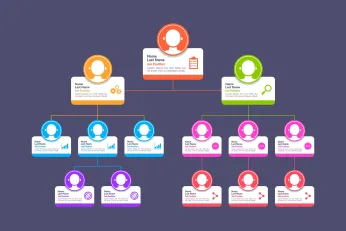3 raisons de gamifier les ventes et des conseils pour les rendre plus attrayantes
Envie de ludifier les ventes ? Découvrez 5 méthodes éprouvées pour renforcer l'engagement des équipes et obtenir des résultats. Apprenez à mettre en œuvre des éléments de type jeu pour motiver votre force de vente et atteindre le succès.
Sur cette page
Dans le monde trépidant de la vente, les concours sont depuis longtemps considérés comme les champions de la motivation, promettant de propulser les équipes vers des sommets. Les concours de vente sont un outil populaire et souvent efficace que les entreprises utilisent pour motiver et engager leurs équipes de vente. Pourtant, pour de nombreuses entreprises, la réalité n'est souvent pas à la hauteur des attentes.
Vos concours de vente ne donnent pas les résultats escomptés ? Vous n'êtes pas seul.
Selon lesstatistiques récentes73 % des entreprises se déclarent insatisfaites de l'efficacité de leurs concours de vente, invoquant un manque d'engagement et des résultats décevants.
Si vos concours de vente ne répondent pas aux attentes, il est essentiel d'identifier les raisons de leur faible performance et de mettre en œuvre des stratégies pour renforcer leur efficacité.
Cela dit, dans ce blog, nous allons explorer les raisons les plus courantes pour lesquelles vous devriez gamifier votre concours de vente et vous donner des conseils précieux pourrendre vos concours de vente vraiment attrayantsLes concours de vente, qui combinent l'excitation de la gamification avec des récompenses et des incitations irrésistibles.
Pourquoi jouer avec votre concours de vente ?
Les méthodes traditionnelles créent une communication opaque et un faible engagement. Les équipes de vente sont souvent confrontées à des fiches d'objectifs répétitives et insistantes, sans retour d'information en temps réel, tandis que les responsables sont confrontés à des retards dans la publication des concours et le suivi des performances. Il est donc difficile de mettre en œuvre des idées de concours de vente créatifs et des idées de concours d'incitation à la vente efficaces, ce qui entraîne des inefficacités dans la compétition commerciale globale.
1. Nécessité de la gamification dans la vente
L'intégration de la gamification des incitations transforme le processus de vente. En incorporant des jeux d'incitation à la vente et diverses idées de concours de vente, les équipes sont plus engagées et motivées.
Les responsables régionaux bénéficient d'informations en temps réel qui leur permettent de gérer efficacement la concurrence commerciale, et les administrateurs du programme peuvent tirer parti de processus rationalisés pour garantir des versements de primes précis et en temps voulu - autant d'éléments essentiels à la réussite de la gamification des ventes.
2. Avantages de la solution numérique
Le logiciel doit permettre de publier des fiches d'objectifs, des plans d'incitation et des concours pour les vendeurs et de suivre leurs performances en continu. Des modèles prêts à l'emploi peuvent permettre de publier des programmes en moins de 10 minutes. Le produit doit effectuer descalculs en temps réel, générer des tableaux de bord et donner des coups de pouce aubon moment. Voici quelques fonctionnalités de base du logiciel.
- PublierConcours& plans d'incitation
- Cartes de pointage en direct
- Paiements en un clic
- Groupes et communautés
- Incitations et notifications
- Tendances et perspectives
3. Analyse des coûts
Le besoin du produit n'est pas seulement decalculer Il vous aide égalementà assurer la transparence des données qui comptent pour vos vendeurs et vos chefs d'équipe. Compass s'intègre à votre CRM et aide votre entreprise de la manière suivante -
- Une communication 100% claire et transparente
- 80% d'augmentation de la productivité des ventes
- 90% d'économie sur le temps de traitement
- 15% de réduction sur les budgets
- 20% d'impact sur les taux d'attrition
Si vous avez pris conscience de la nécessité du produit, voici les composants les moins coûteux dont vous aurez besoin pour construire la solution vous-même.
- Des mises à jour gratuites du logiciel à vie selon les meilleures normes du marché
- Pas de problèmes de codage, de développement et de maintenance
- Aucune erreur de calcul garantie
- Des informations et des tendances gratuites pour rendre le programme d'incitation plus intelligent
- Des experts de l'assistance technique toujours à votre disposition
Voyons comment la ludification du concours de vente peut aider les commerciaux à vendre davantage.
Comment la ludification de la compétition commerciale aide-t-elle les commerciaux à vendre davantage ?
La gamification des ventes est le processus qui consiste à appliquer les éléments et les caractéristiques de la conception d'un jeu aux ventes.Elle comprend l'attribution de points pour certaines actions réussies, l'organisation de compétitions régulières et la récompense des commerciaux pour leurs performances. Elle est principalement utilisée pour transformer en jeu les tâches liées au pipeline, telles que l'appel de prospects, l'organisation de réunions et la conclusion d'affaires.
La gamification des jours prédéfinis utilise généralement une technologie et une interface qui créent une simulation de type jeu pour les représentants commerciaux. Voici un exemple deCompasslive en action.
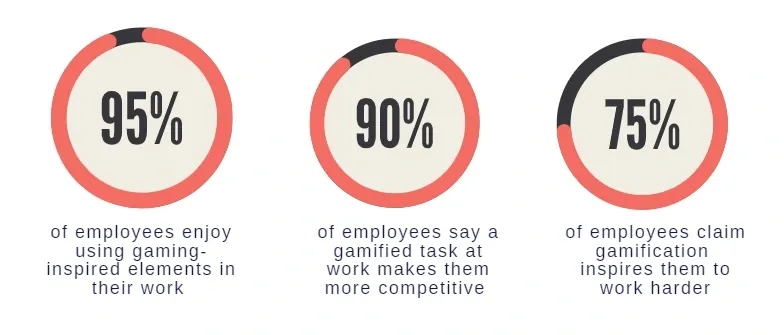
1. Des objectifs plus clairs
Compass aide les participants à se fixer des objectifs en leur permettant de définir leurs propres objectifs, puis en les adaptant au jeu.
2. Jeu basé sur des étapes
Les jeux basés sur des jalons décomposent les objectifs en plusieurs parties, les rendant ainsi plus réalisables, ce qui peut être facilement configuré sur Compass.
3. Récompenses
Compass aide non seulement les participants à gagner des récompenses, mais aussi les organisations à mettre en place des récompenses significatives.
4. Classements en direct
Compass permet d'afficher des tableaux de bord qui récompensent et renforcent les comportements, au lieu de se contenter de vanter les résultats, ce qui facilite la compréhension des comportements générateurs de revenus.
5. Notifications et incitations en temps réel
Les notifications en temps réel et les "nudges" sur Compass permettent de décomposer les objectifs de performance en interventions judicieusement programmées pour stimuler les réalisations.
Lorsque vous fixez des objectifs aux équipes de vente, il devient plus facile pour elles d'accomplir des tâches et de travailler à la réalisation de cet objectif. La gamification peut aider à motiver vos employés pour qu'ils accomplissent leurs tâches efficacement, ce qui contribue à augmenter les ventes globales.
5 conseils pour rendre les concours de vente attrayants grâce à des récompenses et des incitations ludiques
Des études montrentque 90 % des commerciaux sont plus productifs au travail lorsqu'ils participent à des programmes ludiques tels que les concours de vente. Transformez donc vos concours de vente ennuyeux en expériences magiques qui captivent votre équipe et la propulsent vers le succès. L'introduction de récompenses gamifiées et d'incitations attrayantes peut transformer l'expérience en une aventure palpitante. Voici comment procéder :
1. Créer une atmosphère de jeu
Transformez vos concours de vente en un jeu captivant en incorporant des éléments tels que des points, des badges et des tableaux de classement. Faites en sorte que le parcours vers les objectifs de vente ressemble à une quête épique.
Expliquez clairement aux participants comment ils gagnent des points, obtiennent des badges et grimpent dans le classement. Cela crée un sentiment de compétition amicale et ajoute un élément d'amusement à la routine quotidienne de la vente.
2. Aligner les incitations sur des objectifs réalisables
Incitez les personnes à attendre les trésors à chaque niveau en les alignant sur des objectifs réalisables. Qu'il s'agisse d'atteindre des objectifs de vente spécifiques, de conquérir de nouveaux clients ou de parvenir à un taux de conversion donné, veillez à ce que les objectifs soient stimulants mais réalistes. Cela permet de maintenir l'enthousiasme et de motiver les membres de l'équipe à repousser leurs limites.
3. Personnaliser les récompenses pour une motivation individuelle
Reconnaissez que chaque membre de l'équipe est motivé par des raisons différentes. Les récompenses monétaires peuvent motiver certains, tandis que d'autres apprécient la reconnaissance ou les expériences uniques. Personnalisez vos récompenses pour répondre aux diverses préférences de votre équipe.
Qu'il s'agisse d'argent liquide, de reconnaissance ou d'une escapade d'un week-end, choisissez des récompenses qui illuminent les yeux de votre équipe. Faites-les rêver et voyez leur motivation monter en flèche. Cela stimule la motivation et crée un sentiment d'appréciation pour les contributions individuelles.
4. Introduire des éléments de mystère et de surprise
Gardez les participants en haleine en introduisant des éléments de mystère et de surprise tout au long du concours. Pensez à ajouter des récompenses inattendues, des primes spéciales ou des défis cachés qui débloquent des incitations supplémentaires. L'élément de surprise ajoute une couche supplémentaire d'excitation, donnant au concours de vente l'impression d'être une aventure avec des rebondissements inattendus.
5. Encourager la collaboration par des défis en équipe
Favorisez l'esprit de camaraderie en intégrant à vos concours de vente des défis à relever en équipe. Créez des scénarios dans lesquels les membres de l'équipe doivent collaborer pour atteindre des objectifs collectifs.
Les récompenses de ces défis peuvent être partagées entre les membres de l'équipe gagnante, ce qui favorise le travail d'équipe et un environnement de travail positif. Cela ajoute un aspect social au concours et renforce les liens au sein de l'équipe de vente.
Avec des récompenses qui brillent, une gamification qui ajoute une touche d'amusement et des incitations qui stimulent l'ambition, vos concours de vente peuvent devenir des expériences enchanteresses qui laisseront un impact durable. Il ne s'agit pas seulement de conclure des affaires, mais de créer un voyage magique où chaque membre de l'équipe se sent inspiré, valorisé et prêt à relever le prochain défi.
Améliorez votre jeu de vente avec Compass: Une révolution de la gamification pour stimuler la performance
Pour garder une longueur d'avance, il faut faire preuve d'innovation et de motivation stratégique dans le paysage commercial en constante évolution. Entrez dans Compass, votrecompass de la réussite dans les concours de vente gamifiés. Compass simplifie le processus de création de concours et vous permet d'influencer les performances par rapport aux indicateurs clés de performance (KPI) et de favoriser des changements de comportement positifs.
Voyons comment Compass peut révolutionner vos concours de vente et améliorer les performances de votre équipe.
1. Diverses formes de concours
Compass offre une gamme polyvalente de formats de concours pour répondre à vos objectifs. Que vous souhaitiez influencer les performances hebdomadaires, mensuelles, trimestrielles ou annuelles, vous avez le choix entre les jalons, les courses, les compteurs ou le bingo pour obtenir les bons résultats. Cette flexibilité garantit que vos concours de vente s'alignent sur le calendrier et les objectifs qui comptent le plus pour votre équipe.
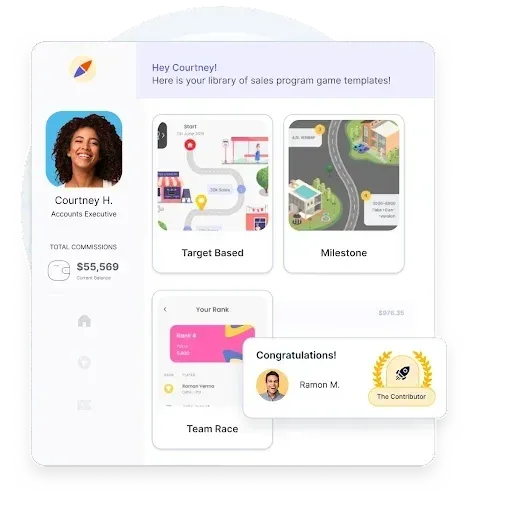
- Basé sur des objectifs: Influencer les performances sur des périodes spécifiques.
- Basé sur la compétition: Favoriser une saine concurrence au sein des équipes ou entre elles.
- Plans spéciaux: Obtenez des résultats ciblés dans des domaines spécifiques tels que la vente de produits ou la liquidation des stocks.
- Programmes en cascade: S'attaquer aux performances de fin de carrière, aux personnes les plus performantes, ou mettre en œuvre des programmes PIP (plan d'amélioration des performances).
2. Incitations et notifications personnalisées
Exploitez le pouvoir de persuasion du moteur nudge de Compass pour inciter à une action opportune. Décomposez les objectifs de performance en interventions bien ciblées. Envoyez des mises à jour personnalisées en fonction de vos propres performances, de votre participation à des programmes ou de vos remboursements.
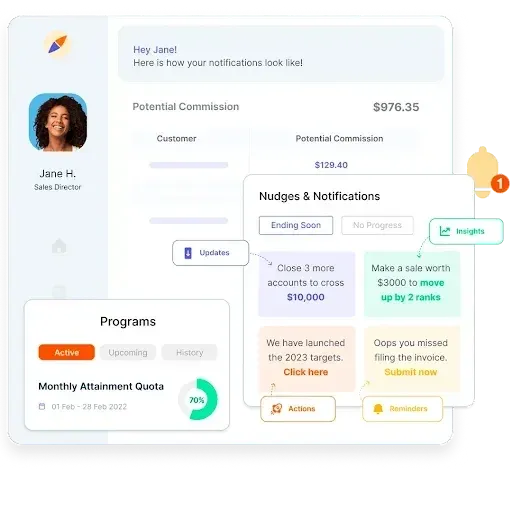
Programmez des incitations telles que des comparaisons de performances relatives, des opportunités de gains, des annonces de l'entreprise et des rappels pour maximiser l'engagement et maintenir votre équipe sur la bonne voie.
3. Groupes et communautés pour la communication interne
Encouragez un sentiment de communauté et de collaboration au sein de votre équipe de vente avec le hub de communication de Compass. Créez des groupes de discussion pour encourager les conversations, partager les meilleures pratiques et stimuler une saine concurrence.
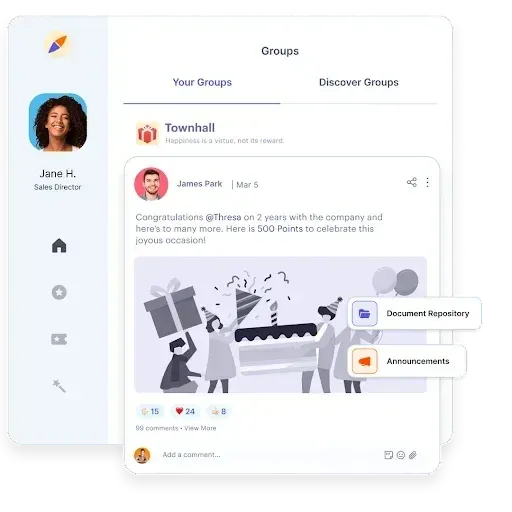
Utilisez les flux d'activité, les référentiels de documents, les groupes de discussion et les annonces pour améliorer la communication interne. Les notifications push garantissent que les mises à jour importantes ne sont jamais manquées.
4. Motiver avec des informations sur les gains potentiels
Donnez à votre équipe les moyens de mesurer et de planifier le succès grâce au simulateur de rémunération de Compass. Il fournit des données en temps réel sur les tendances, les opportunités et les réalisations en matière de rémunération.
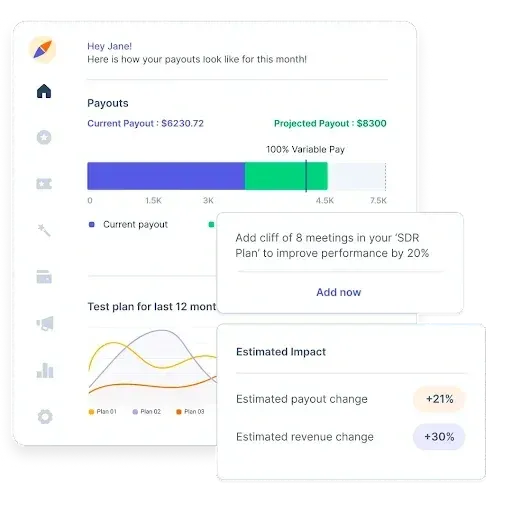
En présentant des informations sur les revenus potentiels, Compass crée un environnement axé sur l'accomplissement, motivant votre équipe à atteindre ses objectifs en comprenant clairement les récompenses qui l'attendent.
Étude de cas : eKart renforce l'engagement des responsables de la distribution grâce à la gamification des incitations sur Compass
eKart, le principal fournisseur de services logistiques et de chaîne d'approvisionnement en Inde, a reconnu le rôle essentiel des responsables des livraisons dans l'expérience des clients. Confrontée à des défis tels que l'augmentation des coûts de livraison, les retards de livraison et un taux d'attrition élevé, eKart a cherché à stimuler l'engagement et l'efficacité des chargés de livraison. Dans sa quête d'une solution, elle s'est associée à Compass, une plateforme d'incitation ludique.
Vue d'ensemble du client
eKart, créé en 2009 en tant que branche interne de la chaîne d'approvisionnement de Flipkart, a évolué pour devenir un fournisseur de solutions logistiques complètes. Réputé pour la fiabilité de ses livraisons et son excellence opérationnelle, eKart dessert des entreprises dans toute l'Inde, traitant environ 10 millions d'envois par mois dans 3800 codes pin.
Défis
- Coûts de livraison: Les retards et les erreurs de livraison gonflaient les coûts, ce qui avait un impact sur la santé financière de l'entreprise.
- L'engagement et l'attrition des DE: La faible motivation des DE a entraîné des taux d'attrition élevés, ce qui s'est traduit par des dépenses récurrentes pour l'embauche et la formation.
Objectifs
- Structure des incitations: Gérer les différents niveaux d'incitation pour les DE au niveau du hub, de la zone et de la région.
- Amélioration de l'efficacité: Renforcer les activités permettant d'améliorer l'efficacité des prestations.
- Faussestentatives delivraison: Éliminer les fausses tentatives de livraison grâce à un meilleur suivi et à une meilleure motivation.
La solution Compass
eKart a mis en œuvre Compasspour automatiser et numériser son programme d'incitation. La plateforme a intégré des éléments de type jeu, des récompenses et des reconnaissances, offrant un accès complet aux informations du programme d'incitation pour le vaste réseau de 2 lakh d'agents de livraison d'eKart.
Caractéristiques principales
- Personnalisation des incitations: Compass a permis de mettre en place plusieurs structures d'incitation, s'alignant sur diverses catégories de prix pour les DE à différents niveaux d'organisation.
- Amélioration des performances: La plateforme a facilité la mise en place de "nudges" opportuns, en orientant les DE vers des activités qui ont été reconnues, récompensées et encouragées, améliorant ainsi l'efficacité de l'exécution.
- Visibilité grâce aux tableaux de bord: les tableaux de bord du site Compass offrent une visibilité en temps réel, permettant à la direction et aux DE de différents niveaux d'identifier les personnes les plus performantes et de les féliciter pour leur contribution exceptionnelle.
- Mesures des taux de fraude: Des mesures en temps réel des tentatives de livraison frauduleuse ont été saisies et intégrées à un système d'incitation inverse dans Compass, ce qui a incité les DE à réduire les activités frauduleuses et, par conséquent, à améliorer l'efficacité globale des livraisons.
Résultats
- Amélioration de l'efficacité des livraisons: eKart a enregistré une amélioration remarquable de 79 % de l'efficacité des livraisons.
- Réduction de l'attrition: Le taux d'attrition a diminué de 48 %, ce qui a permis de réaliser des économies substantielles en matière de recrutement et de formation.
- Visibilité accrue: Compass a assuré la transparence, permettant aux dirigeants de reconnaître et d'apprécier les DE les plus performants.
- Réduction des tentatives de fausse livraison : Grâce à des incitations ciblées et à des mesures en temps réel, eKart a réussi à réduire les tentatives de livraison frauduleuse, ce qui a permis d'accroître la satisfaction des clients.
En exploitant la puissance du site Compass, eKart a non seulement relevé les défis liés à la livraison du dernier kilomètre, mais a également transformé ses stratégies d'engagement des DE. La plateforme d'incitation ludique a considérablement amélioré l'efficacité opérationnelle et contribué à une réduction substantielle de l'attrition, mettant en évidence l'impact transformateur des solutions innovantes dans l'industrie de la logistique.
Conclusion
Les concours de vente ont le potentiel d'être de puissants facteurs de motivation lorsqu'ils sont exécutés de manière réfléchie. Vous pouvez donner un nouveau souffle à vos concours de vente en abordant les questions de clarté, de récompenses, de format, de communication et de soutien, et en renforçant leur efficacité.
N'oubliez pas qu'un concours bien conçu et attrayant stimule les performances et favorise un esprit positif et compétitif au sein de votre équipe de vente, ce qui contribue à sa réussite à long terme.

